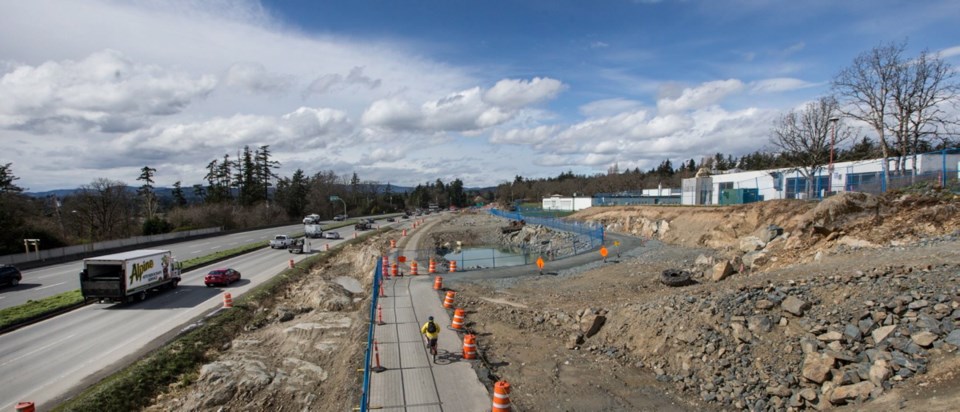People living near the McKenzie interchange project say that noise from jackhammers and the moving of boulders is causing too many sleepless nights.
“For those who aren’t here to experience it at 3 a.m., it sounds like a five-car accident at high speed taking place every minute as the boulders are lifted by clamshell dozers and dropped into steel-bed trucks,” Burnside Road resident Pam Miller said in an email to a senior project official last week.
“No one seems to understand or care to rectify this and a whole neighbourhood is suffering from sleep deprivation.”
Miller said a particular concern with the work, being done about 50 metres from houses in the 1000 block of Burnside Road West, is “the positioning of large boulders” between midnight and 4 a.m.
Nearby resident Stacey Rumsby emailed the Times Colonist about 10 p.m. on Thursday, saying: “The noise level is atrocious for this time of night and it will continue on during the night with no notice of what hour it will retire. … Now try that for months on end.”
Rumsby said the jackhammer work has contributed to her using sleep medication and her daughter missing early-morning music classes.
The Ministry of Transportation says, however, there will be no relief for a while.
“Drilling, blasting and rock hammering will likely continue for a few more weeks depending on the progress being made each day at this location, west of McKenzie Avenue, on the north side of the highway,” the ministry said in a statement.
“The ministry’s project team is working hard to balance the noise impacts for nearby residences and schools with the need to keep traffic flowing.”
Recently, “the contractor needed to jackhammer large pieces of rock left on the highway following blasting in order to clear the rock off the highway and re-open it to traffic as quickly as possible, and also to ensure that the exposed rock face is safe for the traffic passing by on the highway,” the statement said.
The ministry said the contractor is only hammering the large, unmovable boulders on the highway early in the night, and by trying to position other larger rocks for hammering during the day.
“Night-time construction has been allowed by the ministry in an effort to find that balance, in order to keep all modes of transportation — including cyclists and pedestrians on the Galloping Goose trail — flowing during peak period,” the ministry said.
Work is allowed 24 hours a day, seven days a week, on the $85-million project. Drilling and blasting is allowed between 3 and 9 p.m. on weekdays and from 9 a.m. to 9 p.m. on Saturdays.
Residents dealing with the noise say, however, that the overnight restrictions on blasting and drilling are not always followed, or do not provide for peace and quiet.
One Grange Road resident said she has to be in bed by 10 p.m. “to try to eke out four to five hours of sleep on a good night.” She’s sure drilling was taking place overnight May 10, “because our bed was shaking.”
Miller said the ministry should schedule more construction on Sundays, even if it means drivers wait a little longer for traffic lights. That way, she said, the work would be done sooner and provide relief for neighbourhoods near the interchange.



